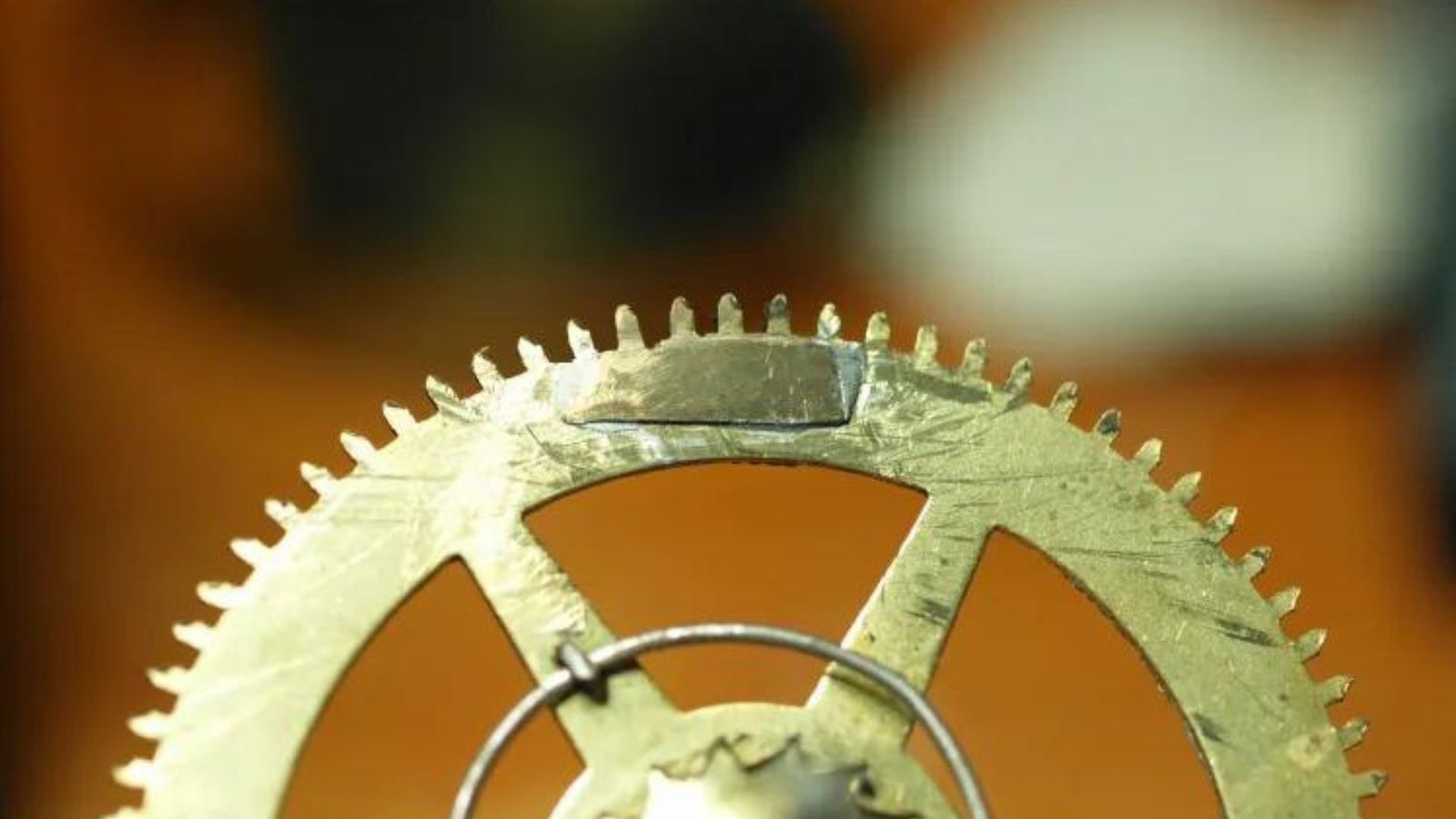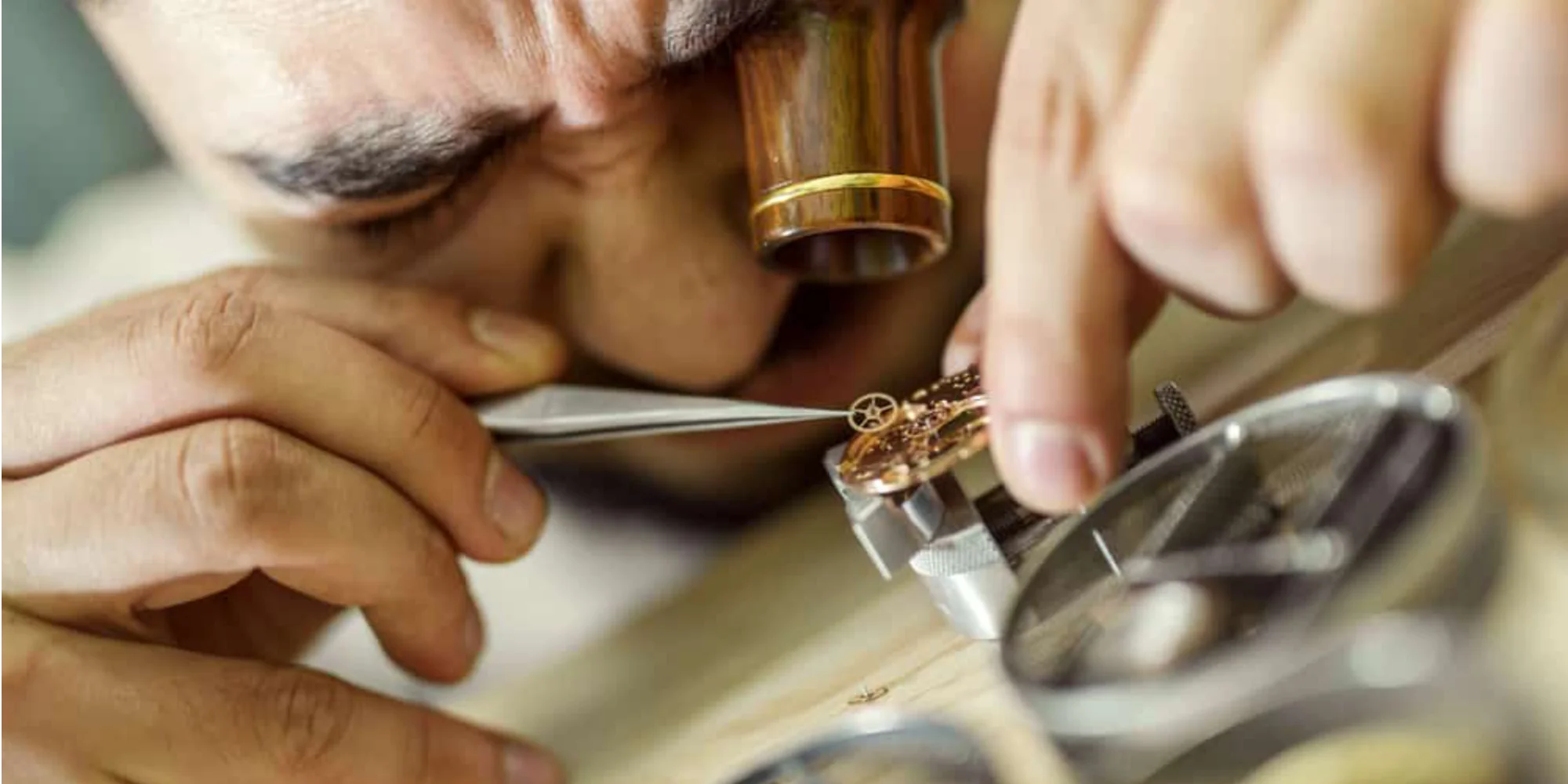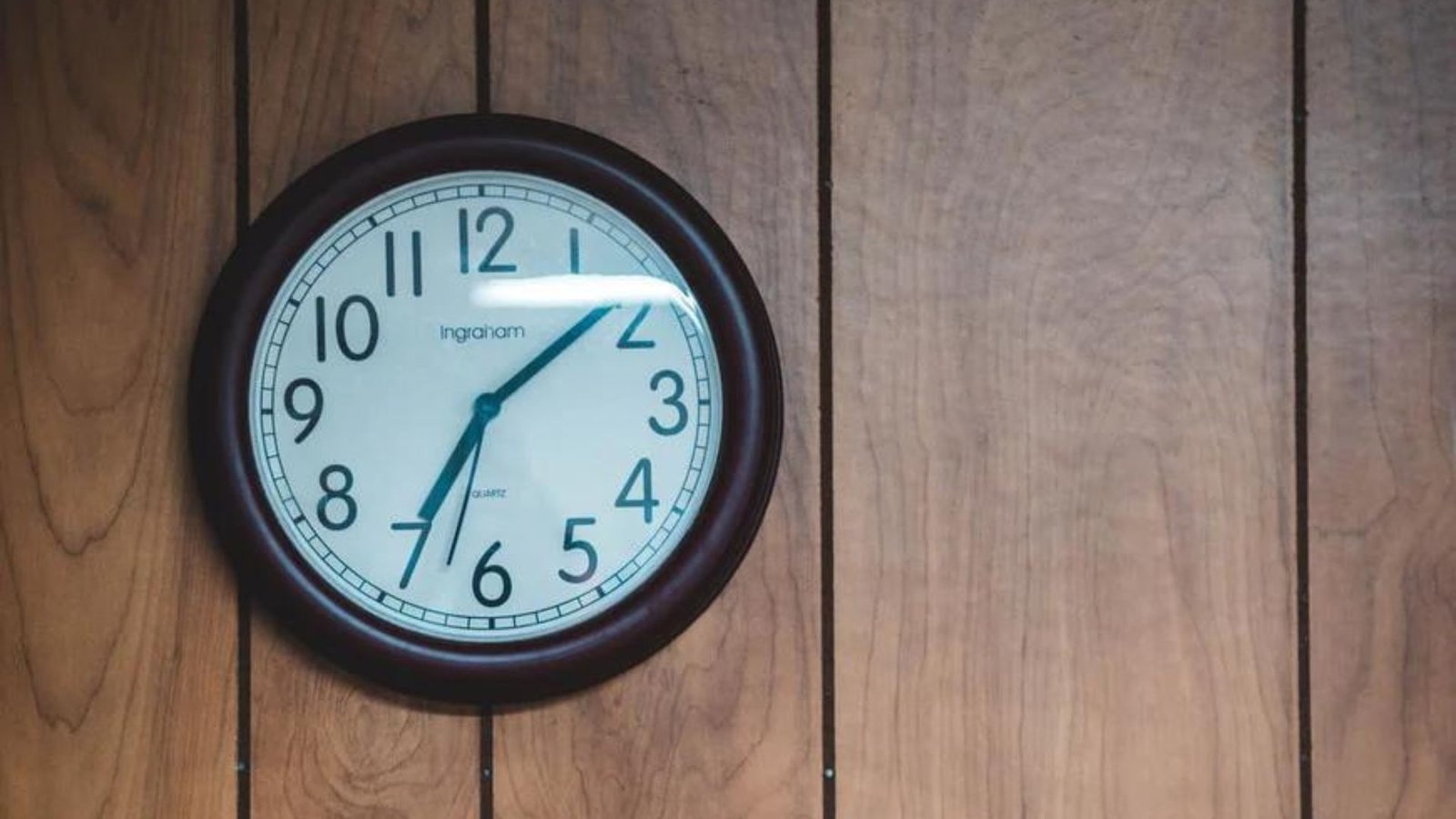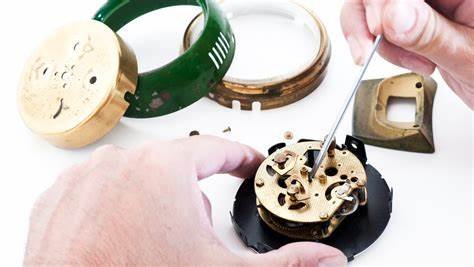Clock movements, also known as clock mechanisms, are the heart of any timepiece. Whether it’s a traditional mechanical clock or a modern quartz one, understanding how these movements work is essential for effective repairs. In this guide, we will explore the different types of clock movements, their components, and how to repair common issues that arise with them.

Types of Clock Movements
There are two primary types of clock movements:
- Mechanical Movements
- Quartz Movements
Mechanical Movements
Mechanical clock movements are powered by a wound spring or a set of gears that control the clock’s hands. These are typically found in older clocks, such as grandfather clocks, mantel clocks, and some wall clocks. There are two main types of mechanical movements:
- Pendulum Movements: Found in clocks like grandfather clocks, where the pendulum regulates the timekeeping.
- Spring-Driven Movements: Powered by coiled springs, these movements are common in smaller clocks like mantel clocks.
Quartz Movements
Quartz movements are powered by a battery and are more common in modern clocks. They use a small piece of quartz crystal that vibrates at a consistent frequency when electric current passes through it. This regulates the timekeeping process. Quartz clocks are known for their accuracy and low maintenance needs compared to mechanical clocks.
Key Components of Clock Movements
Understanding the components of clock movements helps in identifying and fixing problems. Here are some of the essential parts:
- Mainspring: In mechanical clocks, the mainspring stores energy to power the clock.
- Gears: Both mechanical and quartz clocks have gears that transfer energy to the hands.
- Escapement: This regulates the energy release, controlling the movement of the gears.
- Pendulum: In clocks with pendulum movements, it regulates the clock’s speed.
- Quartz Crystal: In quartz clocks, this ensures the timekeeping is accurate.
Common Clock Movement Problems and Repairs
Clock movements can experience several issues that affect timekeeping. Here’s a look at some common problems and how to address them.
Clock Running Too Fast or Too Slow
- Mechanical Clocks: If your clock is running too fast or too slow, the problem may lie with the pendulum. Adjusting the pendulum length can correct the speed.
- Solution: Lengthen the pendulum if the clock is running fast or shorten it if it’s slow.
- Quartz Clocks: For quartz clocks, a timekeeping issue often results from a low battery.
- Solution: Replace the battery and see if the problem persists.
Clock Stops Running
- Mechanical Clocks: A clock that stops running could indicate that the mainspring is not properly wound or is damaged.
- Solution: Wind the clock fully, and if the problem persists, inspect the mainspring for damage.
- Quartz Clocks: A quartz clock stopping is typically due to a dead battery.
- Solution: Replace the battery and ensure the battery contacts are clean.
Chiming Mechanism Not Working
In clocks that chime, such as grandfather clocks, the chiming mechanism may stop functioning if it gets misaligned or jammed.
- Solution: Open the clock to inspect the gears controlling the chime. Make sure they are properly aligned and not obstructed by dust or debris.
Clock Hands Stuck or Not Moving
If the hands of your clock are not moving, it could be due to an issue with the gears.
- Solution: Gently move the hands manually to see if they are misaligned or stuck. If necessary, tighten the nuts or screws holding the hands in place.
Tips for Clock Movement Maintenance
Regular maintenance is key to keeping your clock movements in top shape. Here are some tips:
- Clean the Clock Mechanism: Dust and dirt can accumulate over time and disrupt the clock’s gears. Use a soft brush to clean the mechanism or consult a professional if the clock is complex.
- Oil the Moving Parts: Mechanical clocks need regular oiling to keep the gears moving smoothly. Use clock oil and apply it sparingly to the pivots and gear train.
- Replace Batteries Regularly: For quartz clocks, always replace the batteries as soon as you notice a decline in performance.
- Check the Level: If your mechanical clock isn’t level, the pendulum may not swing correctly. Ensure that the clock is positioned on a flat, stable surface.
Conclusion
Understanding the different types of clock movements and their components is essential for effective repairs. Whether you’re working on a mechanical clock or a quartz one, diagnosing the problem becomes easier when you know how the mechanism works. Regular maintenance, such as cleaning and oiling, can prevent many common issues, ensuring that your clock keeps ticking for years to come.





The elegance in your writing is apparent in every line, creating a sense of harmony that lingers.
I was drawn into your words immediately, not just by the ideas, but by the warmth they radiate.
Betmxs is… well, it’s a betting site aimed at the MX market, I think. Do your research before diving in, okay? Here’s where to find more info tho: betmxs
bong88comlogin.net is the place to go when you need to log into Bong88. Simple and reliable. Check it out here: bong88comlogin
Wenn Sie Ihre Lieblingsspiele genießen möchten, ohne Ihr Zuhause zu verlassen,
ist das Spielen in online Casinos ohne Verifizierung eine großartige Option. Für sowohl den Glücksspieler als auch das Casino
ist dies eine ideale Situation. Hierzu gehören Spielautomaten, Tischspiele, Video-Poker sowie die Möglichkeit, mit Live-Dealern zu spielen. Diese Tabelle zeigt die
Vielzahl an Vorteilen, die online Casinos ohne Verifizierung und
ohne KYC (know your customer) bieten können.
Um anonym zu spielen, können Benutzer auf der Website Einzahlungen in Kryptowährungen wie Dogecoin, Litecoin und
Bitcoin Cash vornehmen. Eine weitere großartige Wahl für Spieler, die anonym spielen möchten, ist Just Casino.
Der Mindestbetrag für eine qualifizierende Einzahlung, um hier um echtes Geld
zu spielen, beträgt 0,20 EUR (entspricht dem Gegenwert in Kryptowährung).
Bitte beachten Sie auch, dass das Glücksspiel süchtig machen kann, und spielen Sie
verantwortungsvoll. Mit der ersten Einzahlung über Trustly ist der komplette
Prozess abgeschlossen und man kann direkt im Casino spielen.
References:
https://online-spielhallen.de/avantgarde-casino-aktionscode-ihr-weg-zu-exklusiven-vorteilen/
7Signs Casino zeichnet sich durch seine unvergleichliche
Auswahl an erstklassigen Spielen, blitzschnellen Auszahlungen und robusten Support
aus. Die Lizenz von Curaçao eGaming verstärkt auch das Engagement
von 7Signs Casino für verantwortungsvolle Spielpraktiken und fördert eine vertrauenswürdige Umgebung, in der die Spieler ihre Lieblingsspiele mit Vertrauen genießen können. Diese Lizenzierung ermöglicht es der Plattform, hohe Standards für den Schutz der Spieler, faire Spielergebnisse und zuverlässige Auszahlungen aufrechtzuerhalten. Darüber hinaus unterstützen wir Kryptowährungstransaktionen mit Bitcoin, Ethereum und USDT, die schnelle und
sichere Überweisungen ermöglichen. Außerdem haben Sie als einer unserer geschätzten Spieler Zugang zu exklusiven Aktionen, einschließlich monatlicher Reload-Boni und wöchentlicher Freispiele.
Machen Sie sich bereit, Ihr Spielerlebnis
mit dem unschlagbaren Willkommensbonus von 7Signs
Casino zu verbessern!
Wir haben uns für eine 7Signs Casino Bewertung auch die Spieleauswahl genauer angesehen und den Kundenservice überprüft.
250% bis zu 900€ + 600 Freispiele + 100 Gratis-Freispiele 100% bis zu 1.000€ + 50 Freispiele 100%
bis zu 500€ + 150 Freispiele
References:
https://online-spielhallen.de/irwin-casino-freispiele-ihr-leitfaden-zu-kostenlosem-spielspas/
Gizmo Casino Bonus
References:
https://online-spielhallen.de/umfassende-bewertung-von-playfina-casino-deutschland-fur-spieler/
Although niche games are few and far between, the advantages usually outweigh the disadvantages for most
players. For high-stakes players, a 50% bonus up to AUD 1,500 is available on deposits of AUD 300 or more using the code HROLLER.
Golden Crown is a trusted online casino catering to Australian players.
Great casino with a huge variety of slots and live casino games.
The games the games are actually a lot better than a lot
of online casinos and doing a bit of work to get a little bonus like this pretty easy so thanks
Very user friendly, casino is interactive with lots
of offers for players new and seasoned.
Indulge in our vast library of 2,000+ expertly curated games, paired
with lightning-fast withdrawals and personalized support from our team of experts.
By operating under a reputable authority,
Golden Crown Casino fosters trust with its players, creating a safe and trustworthy environment
for entertainment and enjoyment. Plus, every Wednesday,
take advantage of free spins on select games, and on weekends, reload
your account for a 50% match up to $10,000. Get ready for
a thrilling online gaming experience at Golden Crown Casino!
At Golden Crown Casino, we weave a tapestry of flawless design and exhilarating play, tailored specifically for Australian players
like you. You’ll find a huge collection of top-quality
casino games, including new releases that can be tested
in demo mode before placing real bets.
The platform uses 128-bit SSL encryption to protect your data, from your login details to your payment details.
The Golden Crown banking system is very flexible, so it’s easy
to fund your account and cash out winnings. Withdrawing money from your account is usually done within 1-3 days, and e-wallets and crypto offer the fastest payouts.
Visit the mobile site, register in seconds, and start winning wherever you are!
Everything is optimised for smaller screens,
ensuring a flawless and user-friendly experience.
References:
https://blackcoin.co/casumo-casino-review-rewards-slots-and-payments-how-is-customer-service/
Explore 5000+ games, live casino tables, and instant sports betting—all optimised for
seamless play on Android, iOS, or any browser.
Join Skycrown Casino now to receive a 100% bonus on your initial deposit, with a chance to
explore a vast array of top-tier slot and live dealer games.
At Skycrown Casino, immerse yourself in a world of live
dealer games that offer an authentic casino experience from the comfort of your home.
Live chat support is available 24/7, and they actually respond — fast.
All deposits are instant, so you won’t be stuck waiting to start playing.
Skycrown makes getting your money in and out
easy — and that’s exactly what you want from an online casino.
The interface is stripped back and smart, with swipe-friendly navigation and quick access
to promos, games, and account settings. It’s fully responsive, so the games scale
perfectly to your screen without squished menus or tiny buttons.
References:
https://blackcoin.co/zoome-casino-australia-in-depth-review/
See what the world is watching — from the hottest music videos to what’s
popular in gaming, fashion, beauty, news, learning and more.
“I use youtube daily for video content. Very useful and great entertainment….” Read more Customers enjoy
watching YouTube content on their TVs, appreciating
that the platform has everything they need. “An easy and stress-free viewing experience for those who enjoy spending free time on watching funny, scary, and informative videos–and more.” Read
more In February 2015, Nintendo agreed to share the revenue with the video
creators through the Nintendo Creators Program.
YouTube Premium was originally announced on November 12, 2014,
as “Music Key”, a subscription music streaming service, and was intended to integrate with and
replace the existing Google Play Music “All Access” service.
It offers advertising-free streaming, access to original programming, and background and offline video playback on mobile
devices. In 2014, YouTube announced that it
was responsible for the creation of all viral video trends,
and revealed previews of upcoming trends, such as “Clocking”, “Kissing Dad”, and “Glub Glub Water Dance”.
In 2008, all links to videos on the main page were redirected to Rick Astley’s music video “Never Gonna Give You Up”, a prank known as “rickrolling”.
YouTube expanded the removal of Russian content from its site to include channels described as
‘pro-Russian’. Russia threatened to ban YouTube after the platform deleted two German RT channels in September 2021.
Google Play Movies & TV formally shut down on January 17, 2024, with the web version of
that platform migrated to YouTube as an expansion of the Movies & TV store to
desktop users. YouTube began offering free-to-view movie titles to its users in November 2018; selections of new movies are added and
others removed, unannounced each month. YouTube Movies &
TV is a video on demand (VOD) service that offers movies and television shows for purchase or
rental, depending on availability, along with a selection of movies (encompassing between 100 and 500 titles overall) that are free to
stream, with interspersed ad breaks. On May 22, 2018, the music
streaming platform named “YouTube Music” was launched for people who
mostly listen to music on YouTube. As of September 2019, the app is available in 69
countries, including Hong Kong and Macau, and
one province. YouTube Kids is an American children’s video app developed by YouTube,
a subsidiary of Google.
References:
https://blackcoin.co/pure-casino-official-site-review/
gamble online with paypal
References:
mcn-kw.com
online casino paypal einzahlung
References:
https://fanajobs.com
online casino usa paypal
References:
saudiuniversityjobs.com
online casino paypal einzahlung
References:
jobteck.com.sg
online poker real money paypal
References:
towerclimbers.work
online casino for us players paypal
References:
careers.simplytech.co.za
What’s up, players! 236betcom… hmm, it’s okay. The games are alright, but the customer support could be better. Just being honest. Worth exploring if you’re curious 236betcom.
An impressive share, I just given this onto a colleague who was doing a little analysis on this. And he in fact bought me breakfast because I found it for him.. smile. So let me reword that: Thnx for the treat! But yeah Thnkx for spending the time to discuss this, I feel strongly about it and love reading more on this topic. If possible, as you become expertise, would you mind updating your blog with more details? It is highly helpful for me. Big thumb up for this blog post!